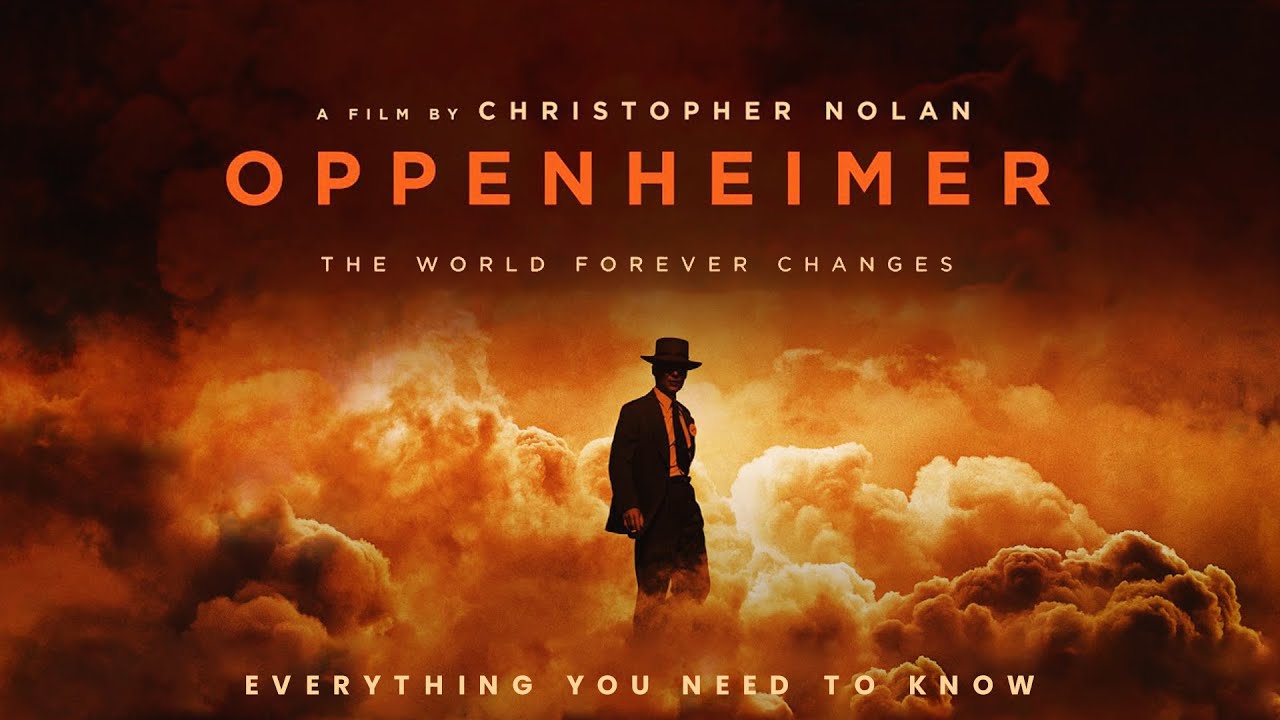Oppenheimer (2023)

Oppenheimer (2023) – Movie Review
Oppenheimer (2023), directed by Christopher Nolan, is a monumental historical drama that delves deep into the life of J. Robert Oppenheimer, the brilliant and conflicted physicist who played a pivotal role in the development of the atomic bomb. Based on the Pulitzer Prize-winning biography American Prometheus by Kai Bird and Martin J. Sherwin, the film explores the moral, political, and personal challenges faced by Oppenheimer as he spearheaded the Manhattan Project during World War II. This biographical epic is both a celebration of scientific achievement and a meditation on the heavy ethical consequences of that achievement.
Plot Overview:
The film primarily follows J. Robert Oppenheimer (Cillian Murphy) from his early academic career to his leadership in the Manhattan Project, where he led a team of scientists to develop the first nuclear weapons in Los Alamos, New Mexico. The narrative is structured in a non-linear fashion, jumping between key moments of Oppenheimer’s life, including his post-war struggles as he faces political scrutiny during the Red Scare and the lasting emotional burden of his role in the creation of the bomb.
The film climaxes with the testing of the first atomic bomb, codenamed “Trinity,” and the subsequent bombings of Hiroshima and Nagasaki. However, Oppenheimer goes beyond the physical spectacle of the bomb to focus on the moral and emotional weight that its creation placed on its architect. The latter part of the film delves into Oppenheimer’s post-war life, where he is haunted by the devastating consequences of his invention and becomes a political target due to his past associations with Communists and his opposition to the nuclear arms race.
Performances:
- Cillian Murphy (J. Robert Oppenheimer): Cillian Murphy delivers a career-defining performance as Oppenheimer, capturing the intense intellect, inner turmoil, and moral complexity of the man. Murphy’s portrayal is nuanced, reflecting both Oppenheimer’s brilliance and his deep personal conflict as he grapples with the consequences of his creation. His ability to convey emotion through subtle expressions and his haunted demeanor makes the character compelling throughout the film.
- Emily Blunt (Katherine “Kitty” Oppenheimer): As Oppenheimer’s wife, Kitty, Emily Blunt brings a fierce intensity to the role. Her portrayal of Kitty reflects both her strength and vulnerability as she supports her husband through the emotional and political turbulence of his career. Blunt’s performance adds a necessary emotional depth to the story, particularly in scenes that explore the couple’s strained relationship.
- Robert Downey Jr. (Lewis Strauss): Robert Downey Jr. is a standout in his portrayal of Lewis Strauss, a powerful figure in the Atomic Energy Commission who becomes one of Oppenheimer’s adversaries. Downey’s performance is both charismatic and menacing, as his character plays a pivotal role in Oppenheimer’s political downfall. This role marks a departure from Downey’s more recent lighthearted characters, showcasing his dramatic range.
- Matt Damon (General Leslie Groves): Damon portrays the no-nonsense military leader who oversees the Manhattan Project. His chemistry with Murphy adds layers to their partnership, as Groves trusts Oppenheimer with the most dangerous and significant project in military history.

Themes:
- The Moral Dilemma of Scientific Progress: At the heart of Oppenheimer is the theme of scientific achievement versus moral responsibility. The film explores the ethical implications of Oppenheimer’s work on the atomic bomb, a weapon capable of mass destruction. Oppenheimer’s internal struggle with the consequences of his scientific achievements is a central focus, raising questions about whether certain scientific advancements should be pursued, no matter the cost.
- Guilt and Accountability: The film portrays Oppenheimer as a man weighed down by guilt, both for the creation of the bomb and the devastation it caused in Japan. His famous quote, “Now I am become Death, the destroyer of worlds,” serves as a haunting reflection of the psychological burden he carried for the rest of his life. The story delves into how Oppenheimer deals with his role in history, as well as how society holds him accountable for the bomb’s consequences.
- Political Intrigue and Betrayal: Oppenheimer’s post-war life is marked by political persecution during the Red Scare, as he is accused of Communist sympathies and becomes a target of government scrutiny. The film explores how political agendas and power struggles intersect with scientific discovery, ultimately leading to Oppenheimer’s downfall in the public eye.
- Legacy and Impact: The film also touches on the legacy of the atomic bomb and the long-term consequences of Oppenheimer’s work, particularly in terms of nuclear proliferation and the ethical dilemmas surrounding the Cold War arms race. The ripple effects of the Manhattan Project are shown to extend far beyond the immediate impact of World War II.

Cinematography and Direction:
Nolan’s directorial approach in Oppenheimer is grand and cinematic, with a focus on the psychological and emotional weight of the story rather than purely the spectacle of the bomb. Hoyte van Hoytema’s cinematography captures both the expansive desert landscapes of Los Alamos and the intimate moments of personal conflict within Oppenheimer. The film is shot in a combination of IMAX and large-format cameras, giving a sense of scale to the scientific achievement and the devastation that follows.
One of the film’s most visually stunning sequences is the depiction of the Trinity test. Rather than rely on CGI, Nolan uses practical effects to recreate the explosion, resulting in a sequence that is both breathtaking and terrifying. The sound design also plays a crucial role, as moments of eerie silence precede the deafening blast, creating a visceral experience for the audience.
Music and Sound:
The score, composed by Ludwig Göransson, is haunting and evocative, enhancing the film’s emotional and philosophical weight. The music builds tension during the film’s key moments, particularly the Trinity test, and complements the quieter, more reflective scenes. The score weaves in both traditional orchestration and experimental elements, creating an atmosphere that underscores the film’s themes of fear, awe, and regret.
Strengths:
- Masterful Performances: Cillian Murphy’s portrayal of Oppenheimer is nothing short of mesmerizing, and the supporting cast, particularly Robert Downey Jr. and Emily Blunt, deliver standout performances that add emotional complexity and intrigue to the story.
- Historical and Moral Depth: The film successfully navigates the complex moral landscape of the atomic bomb’s creation, offering a nuanced exploration of scientific achievement, personal responsibility, and the far-reaching consequences of war.
- Spectacular Visuals: The film’s practical effects, especially during the Trinity test, are awe-inspiring and add a level of realism that heightens the stakes of the story.
- Cerebral and Thought-Provoking: True to Nolan’s style, Oppenheimer is a film that challenges its audience to think deeply about the ethical implications of scientific progress and the lasting legacy of war.

Weaknesses:
- Dense and Complex: The non-linear structure and the film’s deep dive into scientific and political history may be overwhelming for some viewers, particularly those unfamiliar with the events surrounding the Manhattan Project. At times, the film’s pacing can feel slow, particularly in its more dialogue-heavy sections.
- Lack of Emotional Warmth: While the film delves into Oppenheimer’s psyche, it can feel emotionally distant at times, with a focus more on intellectual and moral dilemmas than personal relationships.
Final Thoughts:
Oppenheimer is a monumental achievement in filmmaking, offering a deeply philosophical and historically rich exploration of one of the most significant figures in modern history. Christopher Nolan’s direction, coupled with stellar performances, makes this film a thought-provoking and visually stunning experience. It is more than just a biopic—it is a meditation on the consequences of human innovation and the ethical dilemmas that accompany groundbreaking scientific discoveries.
For those interested in history, science, or ethical questions surrounding war, Oppenheimer is a must-see film. It challenges audiences to consider the profound implications of scientific advancements and the moral weight that accompanies the power to reshape the world.










